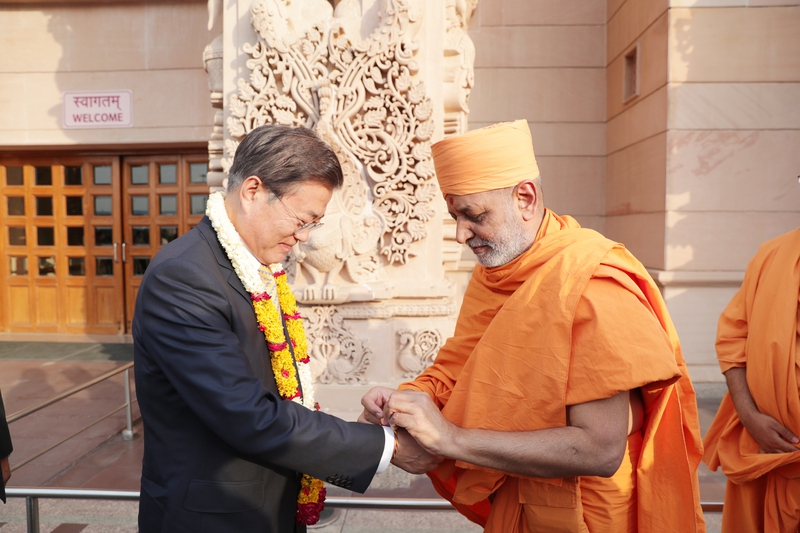 |
|
South Korean President Moon Jae-in visited the Swaminarayan Akshardham Temple, where he was given a Hindu bracelet, upon arriving in New Delhi, India, on July 8. (Yonhap News)
|
Competition with Chinese firms remains fierce
India, which boasts the world’s second-highest population at 1,354,000,000 people (after China’s 1,415,000,000), is attracting South Korean businesses like Samsung Electronics, Hyundai Motor, and POSCO not only as a huge export market but also as an investment base. Many in the business world are looking to it as the “next China,” providing a potential outlet as the US-China trade war enters full swing. South Korea’s trade surplus with India last year was its largest ever at $10.1 billion. The number has risen by around 1,400 times since the two sides formed diplomatic ties in 1973. It accounts for just 2.6% of all exports – far behind either China or the US – but harbors massive growth potential. Around 440 South Korean businesses have already ventured into the country in a variety of areas including consumer goods, infrastructure building, shipping, and finance. The plant in Noida where South Korean President Moon Jae-in met Samsung Electronics vice president Lee Jae-yong has doubled in scale over the past two years thanks to the company’s investment of 49.15 billion rupees (around US$715 million). As a result, mobile phone production has risen from 5 million units a month to over 10 million; refrigerator production has increased from over 100,000 to over 200,000 units a month. Having slipped to second place behind China’s Xiaomi in Indian smartphone market share in the fourth quarter of 2017, Samsung Electronics is looking to the completion of its new factor as an opportunity to launch a more aggressive bid for the Indian market. In the Chinese smartphone market, Samsung Electronics’s once-overwhelming lead over the competition has collapsed, falling from 20 percent in 2013 to under 2 percent today. Losing the Indian market too could leave its smartphone business in crisis. “Samsung Electronics is ranked first in the Indian smartphone market for now, but it’s competing with Chinese businesses for a 1-percent market share,” a Blue House official said by way of explaining the factory visit’s importance. India’s automobile market, which has been growing at annual rates of 7–8%, is another focus of attention for South Korean businesses. Last year, India passed Germany to rank fourth in the world for automobile demand; by 2020, it is predicted to overtake Japan for third. Hyundai Motors, which built a factory in Chennai in the southern Indian state of Tamil Nadu in 1998, sold over 500,000 vehicles last year, ranking second in India’s domestic demand market with a 16-percent share. POSCO has been operating four production plants and processing centers since establishing a local subsidiary in India in 2005, including its leading POSCO India subsidiary. With major world automakers like GM, Volkswagen, Fiat, and Nissan all venturing into the Indian market, industry demand has been steadily rising. POSCO has gone to work building a related production system for the predicted rise in electrical steel demand in the appliance, power generation, automobile, and wind power industries as India begins full-scale economic growth. The Indian market’s strategic significance in particular has grown amid the intensifying trade war between the US and China. On his visit to India, President Moon was accompanied by a large delegation of around 100 businesspeople, including Hyundai Motor president Chung Jin-haeng, SK Lubricants CEO Ji Dong-sup, and LG Electronics president Ahn Seung-kwon Skott. “We are attempting to build new relationships of cooperation, elevating the ASEAN countries and India to partner status on par with the four ‘big ones’ as the ‘next China’ to reduce the threat from the US and China,” explained Minister for Trade Kim Hyun-chong. Rashesh Shah, president of the Federation of Indian Chambers of Commerce & Industry, said that Indian industry is “keener to collaborate with South Korea than ever before thanks to the linkage between South Korea’s New Southern Policy and India’s Act East Policy.” By Choi Hyun-june and Hong Dae-seon, staff reporter Please direct comments or questions to [english@hani.co.kr]






